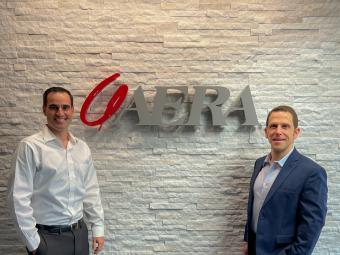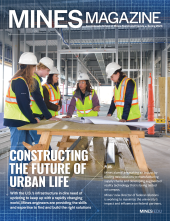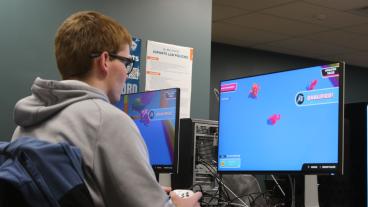Alumni use skills honed as student-athletes to thrive in professional careers
Nicholas Clausnitzer ’07 and Michael Dixon ’06 were teammates on the Mines men’s soccer team, now colleagues at Aera Energy


By Emily Halnon, Special to Mines Magazine
When Nicholas Clausnitzer ’07 and Michael Dixon ’06 met at Mines as students in 2003, they immediately spent nearly every waking hour of the day together. It was preseason for varsity men’s soccer, and they were running drills on the soccer field multiple times a day and sharing meals with their teammates between practices. All that time together meant they became fast friends.
“You bond very quickly during preseason,” Dixon said.
Twenty years later, they’re still spending many waking hours of the day together as colleagues at Aera Energy where their desks sit side-by-side. They jointly manage the reservoir portfolio for the company, which is one of the largest oil and gas producers in California. Clausnitzer leads the efforts for light oil assets, and Dixon is responsible for the heavy oil side of the business. They work to maximize efficiencies so Aera can increase oil output and meet strategic goals for production.
They’ve both been at Aera since they graduated from Mines, ascending through different positions within the company until they took on their current roles about three years ago. While they may be many years removed from their collegiate soccer days, they’re still using the skills they honed as student-athletes to thrive in their professional careers.
“Both of us are very goal-driven,” Dixon said. “And Aera allows us to keep tackling new challenges and keep growing and to do it in an environment that truly feels like a team.”
But it was their first soccer season together that shaped their approach to teamwork and collaboration in their professional lives. The Orediggers won the Rocky Mountain Athletic Conference Men’s Soccer Championship in 2003, which was especially impressive because that year’s team was smaller than the average soccer team. Instead of the standard 25-28 players, they had 17 on the Orediggers team, which meant everyone had to contribute a bit extra and work together to succeed on the field.
“We quickly developed bonds and started acting like a team,” Dixon said. “We didn’t really have any players that were standout all-stars, so we had to work together to perform and overcome challenges.”
“We struggled a lot with such a small team,” Clausnitzer remembers. “But we still found a way to win the conference together.”
Both Dixon and Clausnitzer draw from their experience as Orediggers when it comes to leading their respective teams at Aera. They prioritize collaboration, mentorship, a strong work ethic and shared goals to help their teams succeed.
“The shared vision of a soccer team translates so well to work,” Dixon said. “I try to foster an environment where everyone is committed to the same goal and helping each other get there.”
He points to a recent stretch at Aera where his heavy oil team was constrained by resource limitations. He was able to borrow employees from Clausnitzer’s group to help his side of the portfolio stay on track.
“We understand that it’s about getting the job done and doing whatever holistically benefits our company,” he said. “We know that helping each other out helps Aera win.”
It’s not unlike when they had to play a game in freezing conditions, with shards of ice covering the grass and temperatures so cold that Clausnitzer couldn’t talk because his mouth went numb.
“We called it the Ice Bowl,” Dixon remembers. “But it didn’t matter how cold or miserable the weather was. Everyone was fully committing themselves to the game, sliding through the ice and mud and coming off the field bruised and bloodied.”
Clausnitzer scored the game-winning goal, but win or loss, that game was the kind of experience that brought their team together and highlights what they loved about being part of something bigger than themselves.
They both say that the people at Aera are what have kept them with the company for over 15 years now. And that mirrors what they loved about playing competitive soccer and being able to develop such close and reliable relationships with their teammates.
“I’ve always thought about our soccer team as the ideal state,” Clausnitzer said. “And you may not totally be able to recreate that exact kind of a team at work, but that’s the goal that I want to push towards.”
Clausnitzer and Dixon have continued to function as teammates for more than two decades. They know they can count on each other, and that’s been as valuable for their performance and experience at Aera as it was on the soccer field.
Dixon said, “It makes a huge difference to be able to work with someone that you can rely on and maintain such a close and lasting relationship with.”




